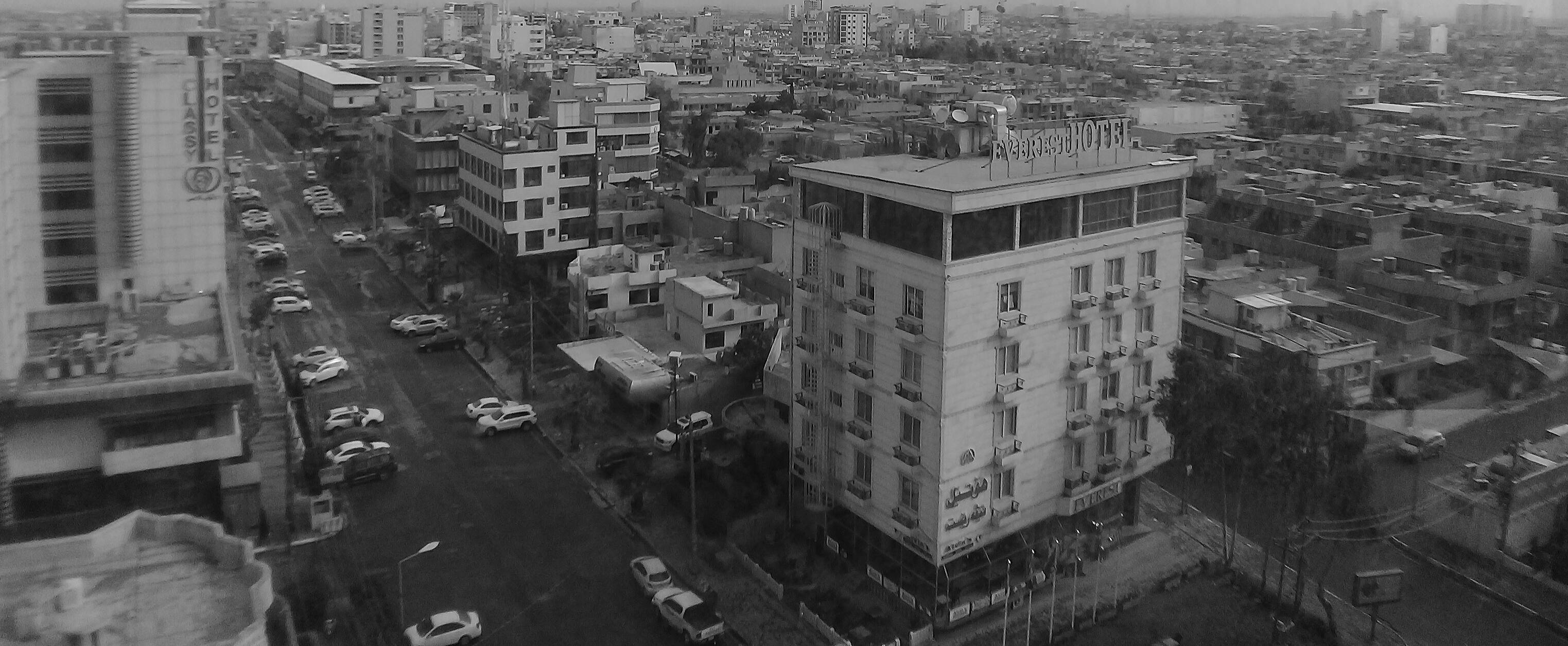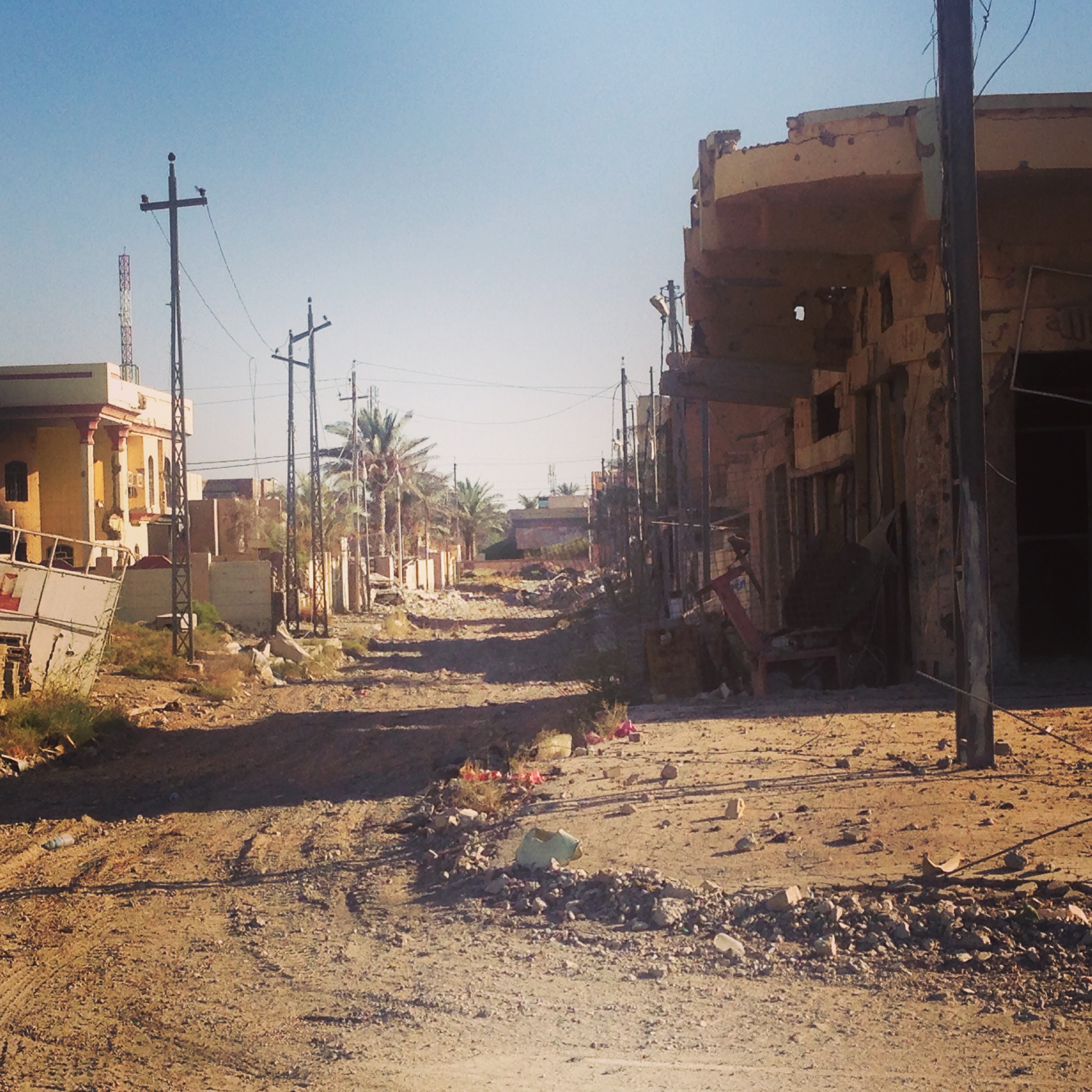
JUDY WOODRUFF: Now the first of three reports this week on the fight for Iraq.
Thirteen years after the U.S. military invasion, the country still struggles to stand on its own, as it faces profound challenges, none more dire than the threat posed by the Islamic State, which controls parts of the country.
Tonight, in partnership with the Pulitzer Center on Crisis Reporting, special correspondent Jane Ferguson and producer Jon Gerberg look at the coming crucial battle to reclaim the city of Mosul from ISIS and to drive it from Iraq once and for all.
JANE FERGUSON: Hungry and crushed together in the punishing sun, these Iraqis, refugees in their own land, desperately grasp for food.
They have fled south of Mosul City, where fighting between government forces and ISIS has been raging for months. New offensives have ISIS in retreat, but with their homes, and all they know, engulfed in the battle, they have come here.
Escaping from Mosul just days ago, this woman says she and her family of seven were lucky to get away. Running away from ISIS is dangerous, and she didn't want to be identified.
WOMAN (through translator): There are many people who want to leave, but cannot. The ones they catch, they break their legs. They just use a block on the sidewalk and break their legs. If the person has already gone very far, they just kill them.
JANE FERGUSON: We are 60 miles south of Mosul. Just up the road, these troops are fighting the ISIS insurgency. Iraqi special forces have already pushed ISIS from many areas of the country. The battles have been tough, destroying almost everything in sight.
The Iraqi army has fought for months over these areas south of Mosul City, swathes of land and villages just like this that they have been pushed out of. But even though they retook this land several months ago, civilians have yet to return.
These soldiers now have their sites set north, planning to take back the city of Mosul, the Islamic State's last remaining major urban base in Iraq.
At 23, Mahmoud has fought and won several battles against the group. And these men are ready to take Mosul.
MAHMOUD DUYOUL SABBAGH, Iraqi Special Forces (through translator): By God, my morale is high. Praise be to God. Praise and thanks be to God. We will kick is from Mosul.
JANE FERGUSON: That confidence is a major turnaround from just two years ago. Then, ISIS rushed into Iraq from Syria and swept down these very roads, as the Iraqi army collapsed and ran away.
It was a humiliating shock for the country's security forces. ISIS declared their conquest a new caliphate, or Muslim empire, with the capital based in Raqqa, Syria, only 140 miles from the border. It was from Mosul that the group's leader, Abu Bakr al-Baghdadi, first appeared in public, preaching in the city's Grand Mosque, demanding obedience from Muslims around the world.
For the past year, Iraq's military has been fighting back, retaking former ISIS strongholds of Fallujah and Ramadi. Now the Iraqi military is planning a showdown with ISIS in Mosul, a battle they hope will push the group out of the country.
Iraqi special forces commander General Maan al-Saadi, believes is will soon be on the run.
GENERAL MAAN AL-SAADI, Commander, Iraqi Special Forces (through translator): No one accepts them, whether civilian or military. We are living in the 21st century. Who would accept bloody savages and killers?
JANE FERGUSON: Across Iraq, the U.S. leads a coalition of 19 countries fighting ISIS, but the push to retake Mosul will be an Iraqi military effort, with U.S. military support.
American airstrikes, guided by the precision of surveillance drones, have already hammered ISIS for more than two years. Heavy vehicles, and attack helicopters, designed to press the fight on the ground, can already be seen on U.S. bases here. And last week, the Pentagon announced an additional 600 U.S. troops are heading to Iraq, bringing the number of American boots on the ground to more than 5,000.
But the Americans will not be on the front lines. That task falls to these regular Iraqi troops. They have already fought ISIS in other, smaller cities, and now each soldier is getting a month of extra training for the tough door-to-door urban warfare expected in Mosul.
It will be a huge test for these men, with Da'esh, as they call ISIS here, likely to challenge their fighting skills more than ever before. To prepare for the variety of threats, roadside bombs, booby traps, suicide car bombs and more, coalition partners from the Australian military are training these young fighters. They have a clear, limited goal.
COL. ANDREW LOWE, Australian Army: When you only have four weeks of training, it's important to keep in the back of our minds is that we are not training them to be like us. We are training them to be what they need to be to defeat Da'esh. So, what we say in the training role, amongst the task group, is, make them better than Da'esh.
JANE FERGUSON: Iraqi soldiers alone cannot defeat ISIS. The upcoming battle for Mosul will involve a complex mix of fighting groups, some at odds with one another. Iranian-backed Shia militias, like these currently on the front line near Tikrit, will be another fighting element.
Accused of taking orders from Shiite commanders in Tehran, they are blamed for stirring sectarian tensions in Sunni areas. Mosul is a largely Sunni city, and their participation in the upcoming fight has been politically divisive.
Iran-backed fighters allied with U.S.-backed forces reflect the reality of Iraq today. There are many players who have found a common goal in defeating ISIS, but it's often the only thing uniting them.
In Northern Iraq, Peshmerga forces from the semi-autonomous Kurdish region near Mosul will also play a role in the fight for the city. They have been at odds with the Baghdad government for decades, seeking independence and a country of their own. They also see parts of Mosul as rightly theirs.
This young Kurdish fighter told us what motivates him.
NEZAR ESMAEL MUSTAFA, Peshmerga (through translator): This is for our future, for the future of Kurdistan. It is an honor and we will give our lives for this cause.
JANE FERGUSON: But the Kurdish fighters, also trained by and allied with the U.S.-led coalition, don't want the Shia militias joining the fight. Their spokesman told "PBS NewsHour" plainly, the Kurds do not approve.
BRIG. GEN. HALGURD HIKMAT, Spokesman, Peshmerga (through translator): The Shia militias are foreigners to the people of that area. They have no relations with the land and the people. If they participate, they will create conflict.
JANE FERGUSON: This is where the battle for Mosul will begin.
Qayyarah, a small town just 35 miles south of Mosul, was occupied by ISIS until they were pushed out just over a month ago. Now some signs of life are returning. At the entrance to the town, a hand-painted sign reads: "Here is Qayyarah, the key to liberating Mosul."
ISIS set fire to Qayyarah oil wells in retreat.
This road is the front line before getting to ISIS-controlled Mosul, and all along the front line here, it is divided up between the various groups who are fighting ISIS. It represents just how complex the battle for Mosul will be.
U.S. Major General Gary Volesky, commander of the Army's 101st Airborne Division, knows the difficulties involved in getting Iraq's combative factions to work together.
PBS NewsHour traveled with the general to Qayyarah Air Field, destroyed by ISIS as they left here, he says. This will be the major hub, where U.S. support troops and Iraqi forces will work together as the offensive gets under way.
MAJ. GEN. GARY VOLESKY, Commander, 101st Airborne Division: All of the stakeholders recognize the importance of Mosul. I mean, we have been to meetings with both the Kurds, the Iraqis, a lot of the different stakeholders, if you will, and they all understand that they have got to come together to defeat Da'esh. And that's what they are doing.
JANE FERGUSON: In 2003, during the early days of the American occupation here, the 101st Airborne was responsible for Mosul.
Colonel Brett Sylvia knows that role has now changed.
COL. BRETT SYLVIA, 101st Airborne Division: I am a soldier. And there is no doubt that if you ask me where I wanted to be, it would be up front, you know, with a rifle in my hand leading. But that's not our role today. Our role is to advise and assist them. And, to be honest with you, it may very well be the right strategy.
JANE FERGUSON: U.S. commanders hope their latest efforts will prevent another 13 years of bloodshed and fighting.
COL. BRETT SYLVIA: I do have a son in the military now. And I do think about it a lot, about, what I am doing today in order to be able to create a long-lasting stability, such that he may not have to come here?
JANE FERGUSON: Stability of any kind has eluded this land for so long that refugees fleeing Mosul will have to survive in places like this. As many as a million civilians live in Mosul City right now.
When they flee, the humanitarian crisis could accelerate from grave to disaster. Camps are already stretched beyond capacity. The United Nations is frantically trying to expand this facility to absorb the expected new arrivals.
MAN: It is also going to start to be raining, and the winter season is going to make any construction a lot more challenging and the living conditions a lot more difficult. So it's really a race against time.
JANE FERGUSON: Despite the hardship, it's better than living under ISIS rule.
WOMAN (through translator): Life is miserable here, but better than where we were before. A price cannot be set for freedom. People's freedom is priceless.
JANE FERGUSON: How long they must stay here will depend on how the fight for Mosul plays out. Defeating ISIS is a short-term goal. But once they have been pushed out of the city, keeping those who have fought them from turning on each other will be the next challenge.
Their hatred of ISIS is the only thing that binds many of Iraq's fighting forces together.
For the PBS NewsHour, I'm Jane Ferguson in Qayyarah, Iraq.

Education Resource
Meet The Journalist: Kenneth R. Rosen
Kenneth R. Rosen traveled to Iraqi Kurdistan, a semi-autonomous region that is home to 4 to 5...










